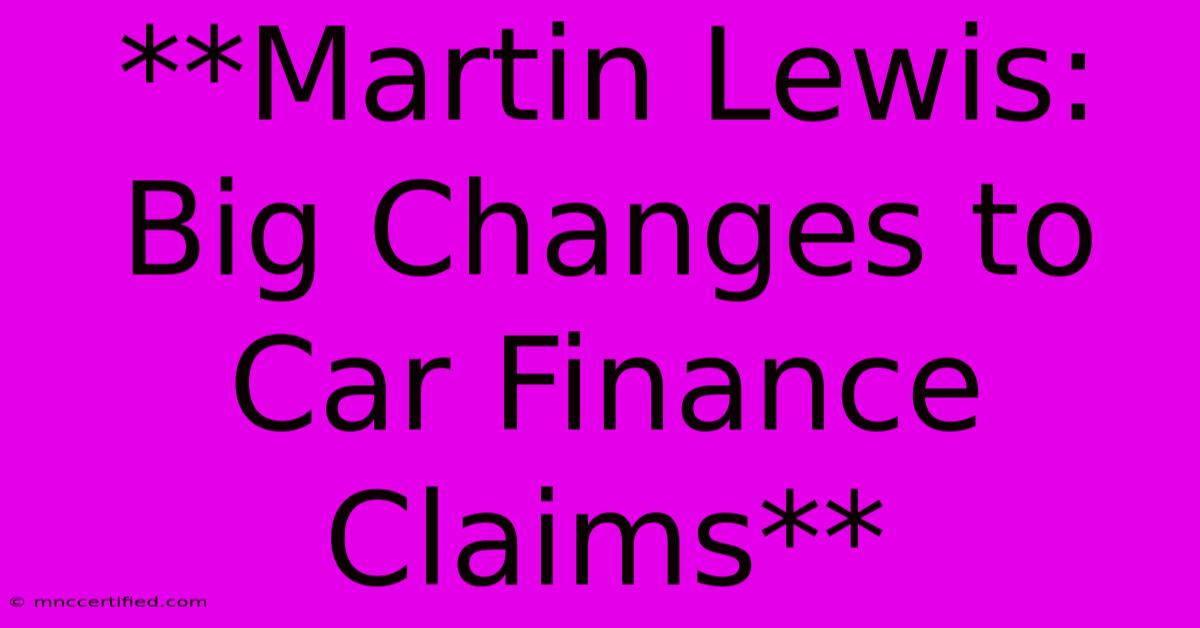**Martin Lewis: Big Changes To Car Finance Claims**

Table of Contents
Martin Lewis: Big Changes to Car Finance Claims - Everything You Need to Know
Martin Lewis, the Money Saving Expert, has recently highlighted significant changes to car finance claims, potentially impacting thousands of drivers in the UK. These changes, stemming from a landmark ruling by the Financial Ombudsman Service (FOS), could mean more people are entitled to compensation for unfair car finance agreements.
This article will delve into the key details of these changes, explaining how they could affect you and what steps you should take if you think you've been wronged.
What are the Changes?
The FOS ruling revolves around 'regulated credit agreements' – car finance agreements where the lender is also the vehicle seller. This is a common setup in the UK, with many dealerships offering their own financing packages.
The key change concerns the treatment of 'optional' extras added to a car finance agreement. In the past, these extras were often considered mandatory, and many customers were pressured into accepting them, leading to inflated finance deals. These 'extras' often included things like:
- Gap Insurance: This covers the difference between the vehicle's market value and what you owe if it's written off.
- Paint Protection: This is a coating applied to the car to protect it from scratches.
- Extended Warranties: These provide coverage beyond the manufacturer's standard warranty.
The FOS ruling now states that these extras should have been truly optional and not bundled with the finance agreement. This means that if you were pressured into taking these extras and didn't fully understand their costs and benefits, you may now be able to reclaim money.
Who Does This Affect?
This change potentially affects anyone who:
- Took out a regulated car finance agreement from a dealership.
- Was pressured into taking optional extras they didn't want or understand.
- Had their finance agreement structured in a way that made the 'optional extras' appear mandatory.
The FOS ruling specifically targets agreements taken out between 2006 and 2019. If your finance agreement falls within this timeframe, you may have a claim.
How to Check if You're Affected
Martin Lewis encourages anyone who thinks they might be affected to check their car finance agreement. Pay close attention to:
- The wording of the agreement: Does it clearly state that the extras were optional, or does it suggest they were mandatory?
- The cost of the extras: Are they clearly broken down, and were you given a chance to remove them?
- Any pressure you felt: Did the salesperson make you feel like you had to take the extras?
What to Do If You Think You Have a Claim
If you believe you have been mis-sold car finance, there are several steps you can take:
- Contact your lender: Let them know about your concerns and request a review of your agreement.
- Contact the Financial Ombudsman Service: If your lender doesn't resolve your complaint, you can submit it to the FOS for independent resolution.
- Seek professional advice: A financial advisor or solicitor specializing in consumer rights can offer guidance and support throughout the claims process.
Key Points to Remember
- Don't delay: There are time limits for making complaints, so act quickly if you think you have a claim.
- Gather evidence: Keep copies of all relevant documents, including your agreement, sales receipts, and any communications with the lender.
- Be persistent: Claiming back money from lenders can be challenging, but don't give up if you believe you have a valid case.
Martin Lewis's advice is to be proactive and not shy away from claiming compensation if you believe you were mis-sold car finance. The changes in the car finance landscape offer a potential opportunity to reclaim money and ensure fair treatment in future agreements.

Thank you for visiting our website wich cover about **Martin Lewis: Big Changes To Car Finance Claims**. We hope the information provided has been useful to you. Feel free to contact us if you have any questions or need further assistance. See you next time and dont miss to bookmark.
Featured Posts
-
Song Jae Rims Impact On K Dramas A Look Back
Nov 13, 2024
-
Line Of Dutys Future Return Confirmed But With A Condition
Nov 13, 2024
-
Verizon Fios Outage Impacts Northeast Customers
Nov 13, 2024
-
Frank Auerbach Dies Painter Fled Nazis
Nov 13, 2024
-
Pistons Outlast Heat In Overtime Battle
Nov 13, 2024